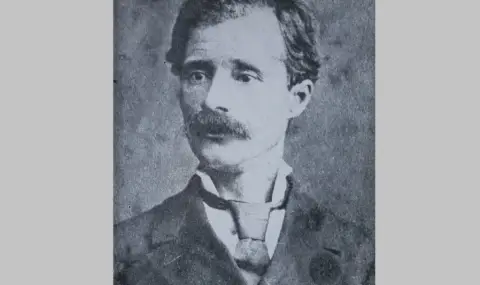On January 25, 1893, Grigor Parlichev passed away in Ohrid.
He was born on January 18, 1830 in Ohrid into a craftsman's family. He lost his father early, his childhood was unhappy and difficult.
Nothing suggests that he will be one of the forgotten intellectuals of our Revival.
He studied in Ohrid - in a monastery school, later with Dimitar Miladinov. He was a teacher in Tirana for one year. In 1850-1851, he studied medicine in Athens, but interrupted due to financial difficulties. He was a teacher in the village of Belitsa, Ohrid region, Prilep and Ohrid. From 1858 he continued his studies at the Faculty of Medicine in Athens, and in 1860 he transferred to the Faculty of Philology. In 1860 he participated in the annual poetry competition in the Greek capital and won first prize and a laurel wreath with his poem "Armatolos" (The Serdar, the Voivode). The commission and the literary community called Grigor Prlichev "the second Homer". He was offered scholarships to the universities of Oxford and Berlin, but he refused.
The news of the death of the Miladinov brothers made him leave Athens and continue the struggle they had undertaken against the Greek clergy, for the introduction of the Bulgarian language in school and in the church. From 1862 he was a teacher in Ohrid.
In 1862 again participated in a poetry competition in Athens with the poem "Skenderbey".
In 1868, he settled in Constantinople for several months to expand his knowledge of the Bulgarian language, Slavic literature and culture. After returning to Ohrid, he replaced the Greek language with Bulgarian in schools and churches. On the denunciation of Bishop Miletius in 1868, he was arrested and thrown into the Ohrid dungeon, later taken to the Debar prison. Released thanks to the intercession of the people of Ohrid, Grigor Prlichev continued his pedagogical and public activities. On his initiative, in 1869, the first community center was established in Ohrid, called "St. Clement". Teaching in Struga, Gabrovo, Bitola, Ohrid and Thessaloniki.
With his first poetic attempts - "Serdaryat" and "Skenderbey" Grigor Parlichev belongs to two national literatures - Greek and Bulgarian, he is spiritually sympathetic to two national cultures. In order to popularize his works among Bulgarian readers, he translated "Serdaryat" (around 1870) into Bulgarian, recalls the website Slovoto.
Grigor Parlichev is the author of poems written in Bulgarian ("Dokoga, bratya mili bulgari", "Chuite, cheda macedonski", "Pesen za anishtozhenieto na Ohridska patriarshija"), of poems about Cyril and Methodius, Clement of Ohridski, etc., of correspondence in the newspapers "Vremya", "Macedonia" (1866-1872), "Pravo" (1869-1873), of unpublished translations from French. He published an announcement that he had prepared for publication a booklet entitled "Upbringing or 12 Moral Songs". In 1884 he wrote "Autobiography", which revealed new aspects of his unique talent as a narrator, folk psychologist, philologist and historian.
Prlichev was the first Bulgarian translator of Homer, although the translation of "Iliad" caused controversy in the periodical press of the Bulgarian Renaissance and was sharply criticized.
